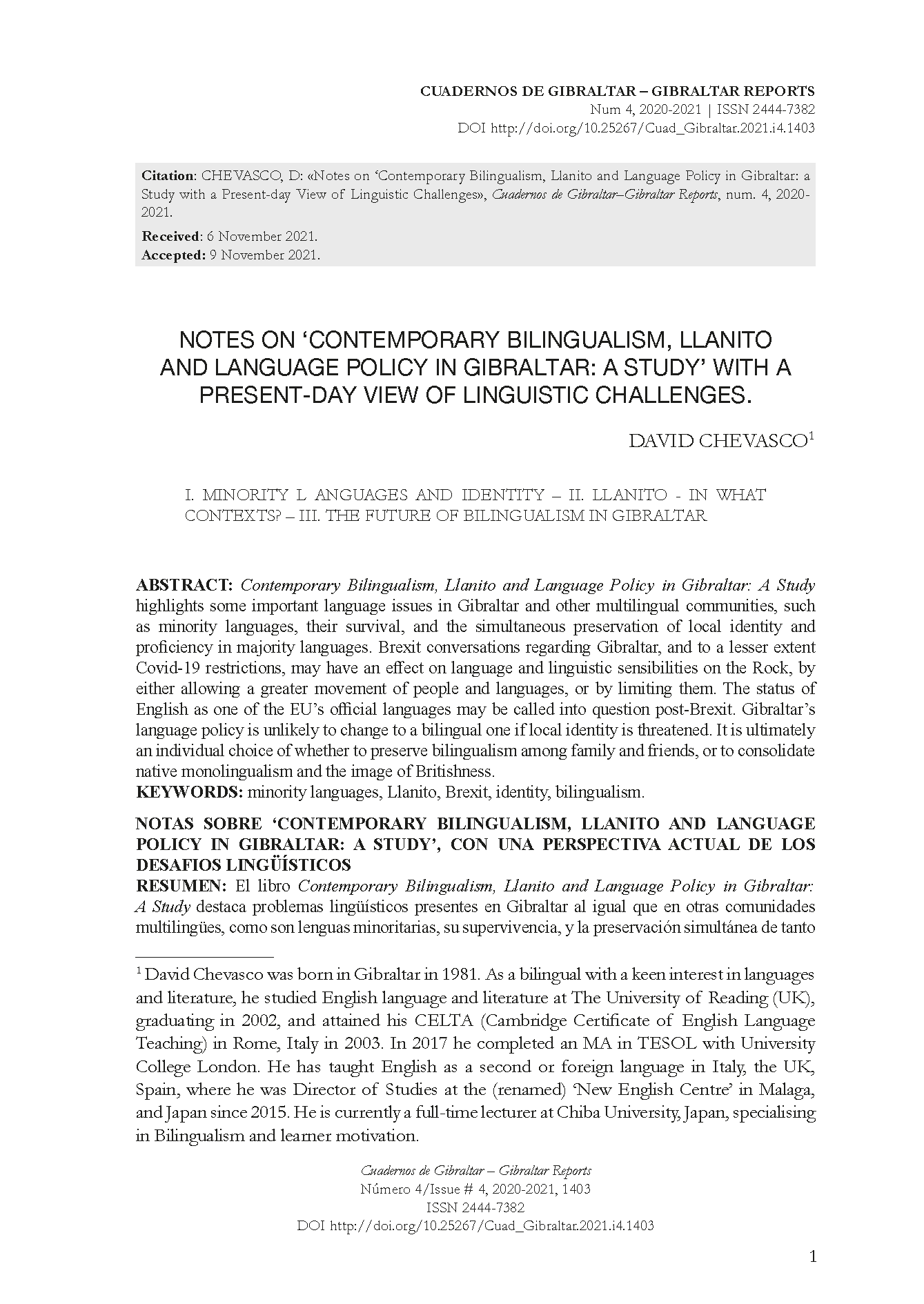Notes on ‘Contemporary Bilingualism, Llanito and Language Policy in Gibraltar: a Study with a Present-day View of Linguistic Challenges
Resumen
NOTAS SOBRE ‘CONTEMPORARY BILINGUALISM, LLANITO AND LANGUAGE POLICY IN GIBRALTAR: A STUDY’, CON UNA PERSPECTIVA ACTUAL DE LOS DESAFIOS LINGÜÍSTICOS
RESUMEN: El libro Contemporary Bilingualism, Llanito and Language Policy in Gibraltar: A Study destaca problemas lingüísticos presentes en Gibraltar al igual que en otras comunidades multilingües, como son lenguas minoritarias, su supervivencia, y la preservación simultánea de tanto la identidad local como el dominio de las lenguas mayoritarias. Las negociaciones de Brexit sobre Gibraltar y, en menor medida, las restricciones de Covid-19, pueden tener efectos sobre el habla y la sensibilidad lingüística local, ya sea permitir un mayor movimiento de personas e idiomas, o limitarlos a ciertos grupos. De la misma manera el Brexit puede poner en duda la condición del inglés como lengua oficial de la UE. No obstante, es poco probable que la política cambie para incorporar el castellano si la identidad de pueblo se ve amenazada, por lo que, en última instancia, se trata de la elección del individuo si preservar el bilingüismo entre familiares y amigos, o consolidar el monolingüismo nativo y la imagen del ciudadano británico de Gibraltar.
Palabras clave
Descargas
Cómo citar
Licencia
Es condición para la publicación que el autor o autores ceda(n) a la Revista, en exclusiva, los derechos de reproducción. Cuadernos de Gibraltar–Gibraltar Reports es una revista de acceso abierto. Su contenido está abierto, sin coste alguno, para cualquier usuario particular o institución. Los usuarios podrán leer, descargar, copiar, distribuir, imprimir, buscar o enlazar el texto completo de los artículos publicados, o utilizarlos para cualquier otro propósito, dentro de la legalidad vigente. Y podrán hacerlo sin coste alguno, y sin necesidad de solicitar permiso al editor o al autor. Todo ello de acuerdo con la definición de acceso abierto de la Iniciativa Acceso Abierto de Budapest.
Citas
Anchimbe, E. A., Structural and Sociolinguistic Perspectives on Indigenisation. Dordrecht: Springer Netherlands. 2014.
Auckle, T. and Barnes, L. “Code-Switching, Language Mixing and Fused Lects: Emerging Trends in Multilingual Mauritius”, Language Matters 42, 1, 2011: 104–25.
Chevasco, D., Contemporary Bilingualism, Llanito and Language Policy in Gibraltar: A Study, Universidad de Cádiz, 2019.
Kellermann, A., A New New English: Language, Politics, and Identity in Gibraltar, Heidelberg: Herstellung, 2001.
Kerswill, P., “Migration and language”, in Klaus Mattheier, Ulrich Ammon & Peter Trudgill (eds.) Sociolinguistics /Soziolinguistik. An international handbook of the science of language and society, 2nd ed. Vol 3. Berlin: DeGruyter. 2006.
Kużelwska, E., “Impact of Brexit on the status of the English language in the European Union”. Środkowoeuropejskie Studia Polityczne University of Białystok, 2019.
Levey, D., Language Change and Variation in Gibraltar, John Benjamins Publishing, 2008.
May, S., “Language Rights: Moving the Debate Forward”, Journal of Sociolinguistics 9, 3, 2005: 319–47.
Peñalva, S. L., “An Ethnographic Portrait of Translingual/Transcultural Navigation among Immigrant Children and Youth: Voices during Sunday School at a Latino Church”, Journal of Multilingual and Multicultural Development. 2016: 1–15.
Pérez-Milans, M., “Language and identity in linguistic ethnography”, in S. Preece (ed) The Routledge Handbook of Language & Identity, New York and London: Routledge, 2015.
Sayer, P., “Demystifying Language Mixing: Spanglish in School”, Journal of Latinos and Education. 7, 2, 2008: 94–112.







